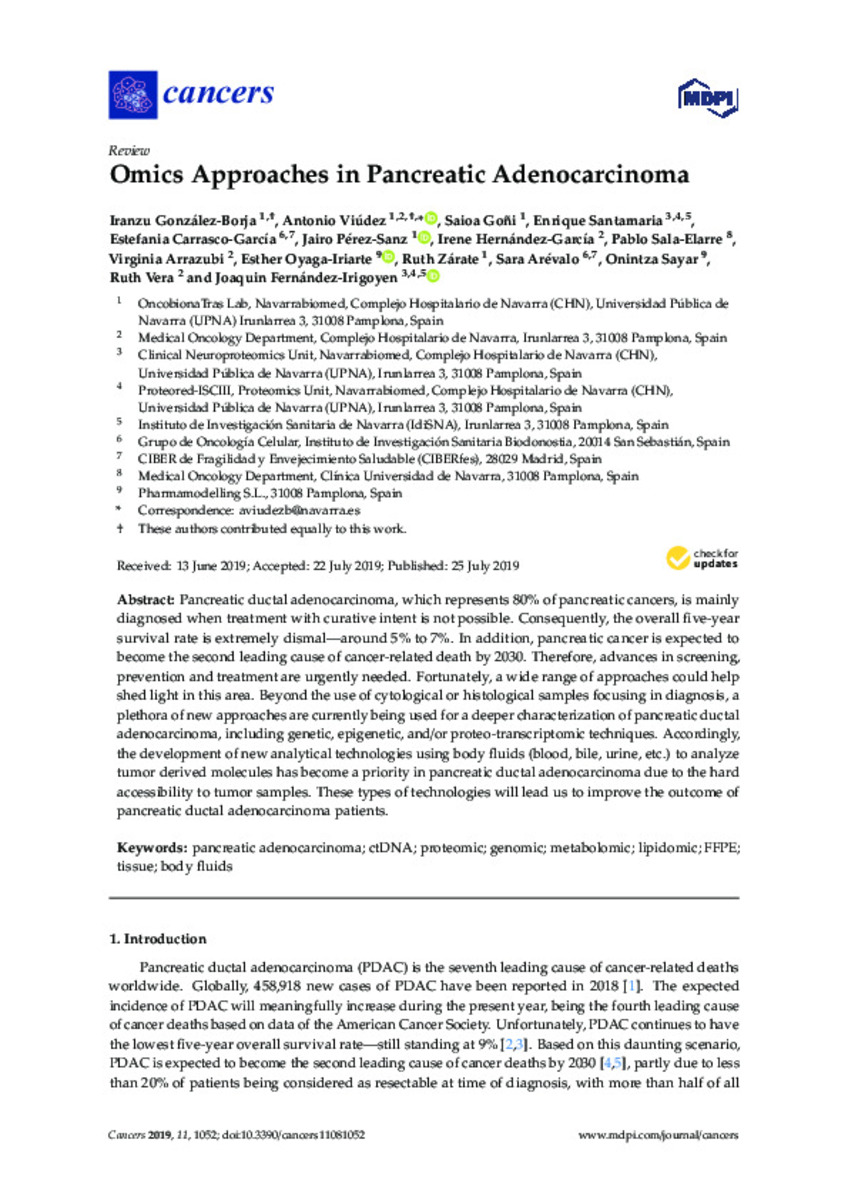Registro completo de metadatos
| Campo DC | Valor | Lengua/Idioma |
|---|---|---|
| dc.creator | Gonzalez, I. (Iranzu) | - |
| dc.creator | Viudez, A. (Antonio) | - |
| dc.creator | Goñi, S. (Saioa) | - |
| dc.creator | Santamaria, E. (Enrique) | - |
| dc.creator | García, E. (Estefania) | - |
| dc.creator | Pérez-Sanz, J. (Jairo) | - |
| dc.creator | Hernández-García, I. (Irene) | - |
| dc.creator | Sala-Elarre, P. (Pablo) | - |
| dc.creator | Arrazubi, V. (Virginia) | - |
| dc.creator | Oyaga-Iriarte, E. (Esther) | - |
| dc.creator | Zarate, R. (Ruth) | - |
| dc.creator | Arévalo, S. (Sara) | - |
| dc.creator | Sayar, O. (Onintza) | - |
| dc.creator | Vera, R. (Ruth) | - |
| dc.creator | Fernandez-Irigoyen, J. (Joaquín) | - |
| dc.date.accessioned | 2021-11-11T09:02:26Z | - |
| dc.date.available | 2021-11-11T09:02:26Z | - |
| dc.date.issued | 2019 | - |
| dc.identifier.citation | Gonzalez, I. (Iranzu); Viudez, A. (A.); Goñi, S. (Saioa); et al. "Omics approaches in pancreatic adenocarcinoma". Cancers. 11 (8), 2019, 1052 | es |
| dc.identifier.issn | 2072-6694 | - |
| dc.identifier.uri | https://hdl.handle.net/10171/62533 | - |
| dc.description.abstract | Pancreatic ductal adenocarcinoma, which represents 80% of pancreatic cancers, is mainly diagnosed when treatment with curative intent is not possible. Consequently, the overall five-year survival rate is extremely dismal—around 5% to 7%. In addition, pancreatic cancer is expected to become the second leading cause of cancer-related death by 2030. Therefore, advances in screening, prevention and treatment are urgently needed. Fortunately, a wide range of approaches could help shed light in this area. Beyond the use of cytological or histological samples focusing in diagnosis, a plethora of new approaches are currently being used for a deeper characterization of pancreatic ductal adenocarcinoma, including genetic, epigenetic, and/or proteo-transcriptomic techniques. Accordingly, the development of new analytical technologies using body fluids (blood, bile, urine, etc.) to analyze tumor derived molecules has become a priority in pancreatic ductal adenocarcinoma due to the hard accessibility to tumor samples. These types of technologies will lead us to improve the outcome of pancreatic ductal adenocarcinoma patients. | es_ES |
| dc.description.sponsorship | This work was funded by grants from Department of Health from Government of Navarra (Ref. 008-2018), REFBIO II Pyrenees Biomedical Network from Programa INTERREG V-A España-Francia-Andora (Ref. BMK_PANC) and Sociedad Española de Oncología Médica (SEOM) to A.V. I.G.-B. is supported by a predoctoral fellowship from Department of Economic Development Government of Navarre “Ayudas para la contratación de doctorandos y doctorandas por empresas y organismos de investigación y difusión de conocimientos: doctorados industriales 2018–2020”. | es_ES |
| dc.language.iso | eng | es_ES |
| dc.publisher | MDPI AG | es_ES |
| dc.rights | info:eu-repo/semantics/openAccess | es_ES |
| dc.subject | Pancreatic adenocarcinoma | es_ES |
| dc.subject | ctDNA | es_ES |
| dc.subject | Proteomic | es_ES |
| dc.subject | Genomic | es_ES |
| dc.subject | Metabolomic | es_ES |
| dc.subject | Lipidomic | es_ES |
| dc.subject | FFPE | es_ES |
| dc.subject | Tissue | es_ES |
| dc.subject | Body fluids | es_ES |
| dc.title | Omics approaches in pancreatic adenocarcinoma | es_ES |
| dc.type | info:eu-repo/semantics/article | es_ES |
| dc.description.note | © 2019 by the authors. Licensee MDPI, Basel, Switzerland. This article is an open access article distributed under the terms and conditions of the Creative Commons Attribution (CC BY) license (http://creativecommons.org/licenses/by/4.0/). | es_ES |
| dc.identifier.doi | 10.3390/cancers11081052 | - |
| dadun.citation.number | 8 | es_ES |
| dadun.citation.publicationName | Cancers | es_ES |
| dadun.citation.startingPage | 1052 | es_ES |
| dadun.citation.volume | 11 | es_ES |
Ficheros en este ítem:
Estadísticas e impacto
Los ítems de Dadun están protegidos por copyright, con todos los derechos reservados, a menos que se indique lo contrario.






